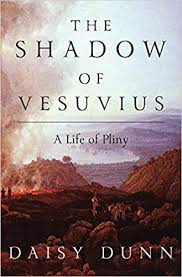Tom Holland at Literary Review:
 Herculaneum, a town on the Bay of Naples that was buried beneath volcanic ash when Vesuvius erupted in AD 79, has only been partially excavated. Some buildings stand open to the sky; others, such as the theatre, can only be accessed through cramped and winding tunnels; many lie entirely entombed within rock. A visitor’s reaction to this can be an interesting gauge of character. The glass-half-full person will exult in the chance to walk the streets of an ancient city. The glass-half-empty person will wish there were more streets to walk. In Herculaneum, where furniture, bread and figs were all carbonised by the pyroclastic surge, the trace elements of life as it was lived in the heyday of the Roman Empire can serve to tantalise as well as satisfy the curious. To study the distant past is always to be greedy. It is to be like Orpheus, snatching after ghosts.
Herculaneum, a town on the Bay of Naples that was buried beneath volcanic ash when Vesuvius erupted in AD 79, has only been partially excavated. Some buildings stand open to the sky; others, such as the theatre, can only be accessed through cramped and winding tunnels; many lie entirely entombed within rock. A visitor’s reaction to this can be an interesting gauge of character. The glass-half-full person will exult in the chance to walk the streets of an ancient city. The glass-half-empty person will wish there were more streets to walk. In Herculaneum, where furniture, bread and figs were all carbonised by the pyroclastic surge, the trace elements of life as it was lived in the heyday of the Roman Empire can serve to tantalise as well as satisfy the curious. To study the distant past is always to be greedy. It is to be like Orpheus, snatching after ghosts.
We can never know enough. This is not an exclusively modern feeling. Two thousand years ago, when Vesuvius erupted, a longing to make sense of what was happening lured antiquity’s most celebrated encyclopedist to his death.
more here.
